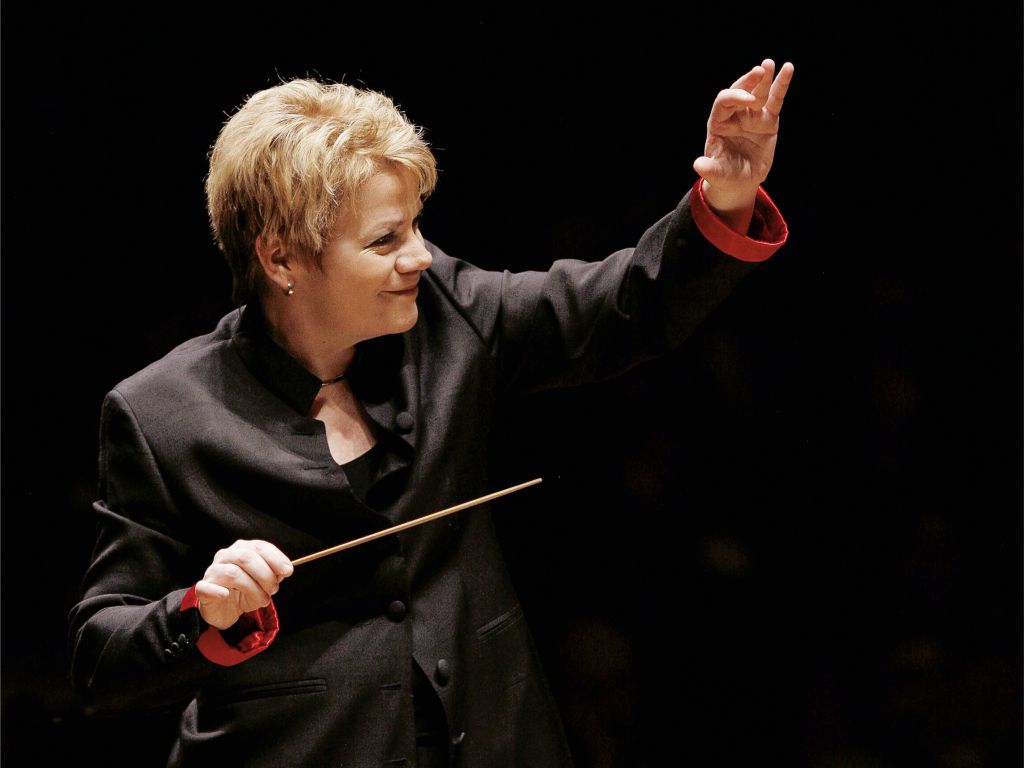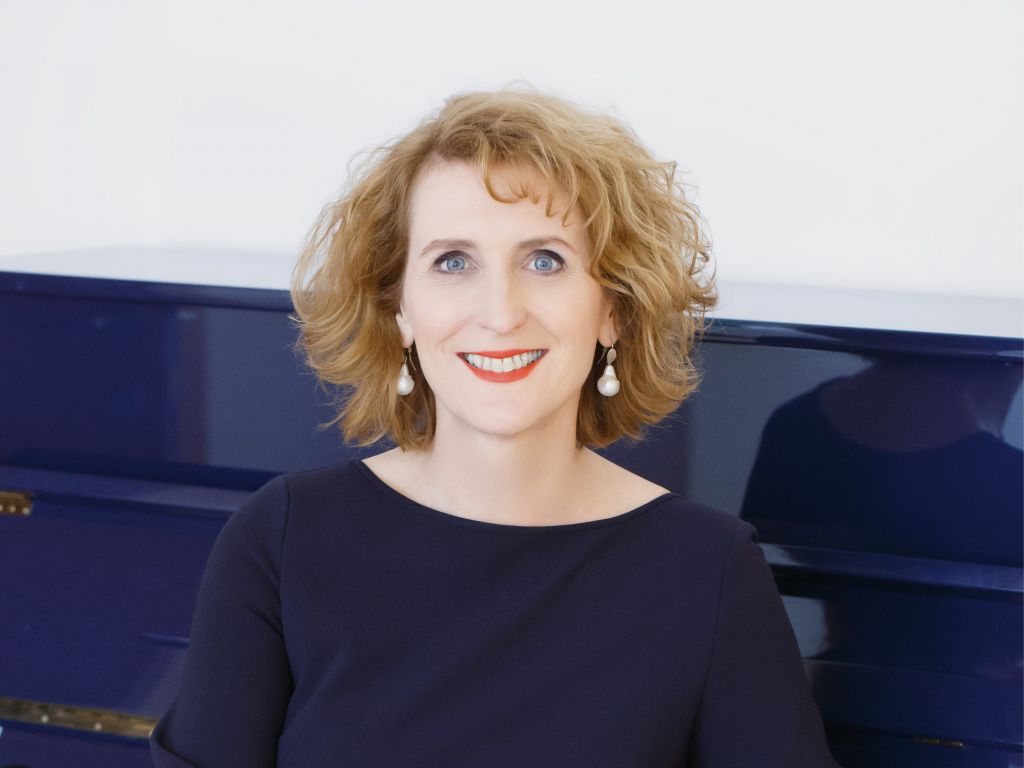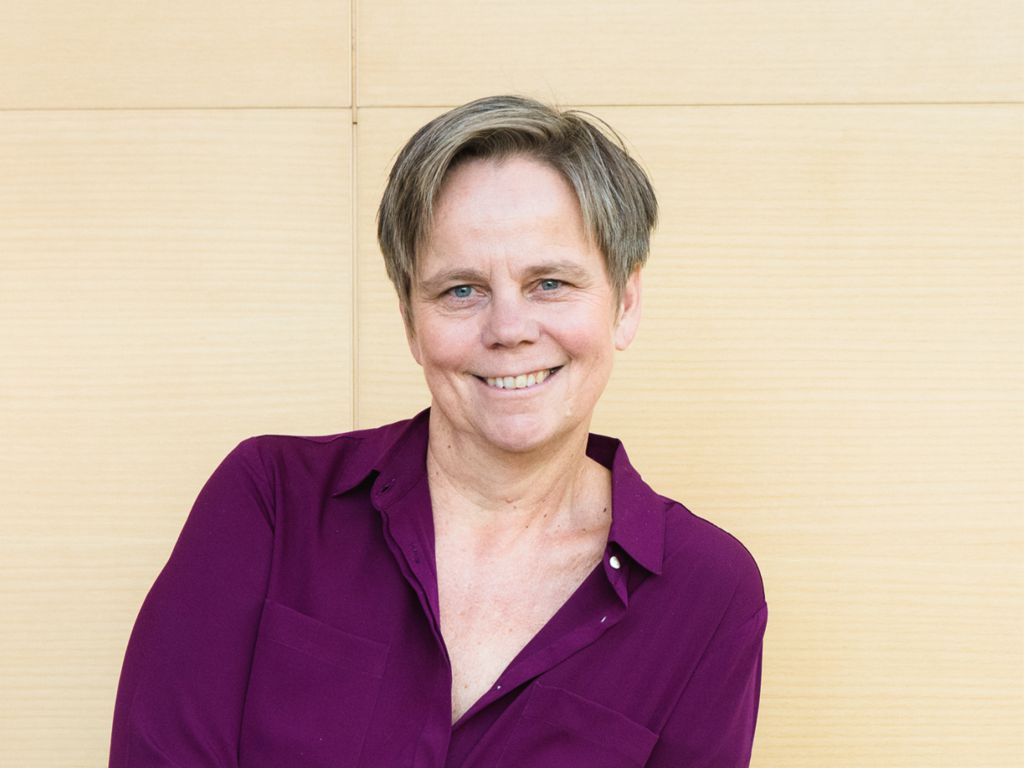Since March 2020, Vienna RSO Chief Conductor Marin Alsop has been an artist in residence at the mdw, where she’s also the first woman to teach orchestral conducting. The maestra joined Rector Ulrike Sych and Vice Rector Gerda Müller for a conversation about quotas, excellence, and equal opportunities.
Some conductors who are women are anything but fond of talking about how women are still a minority in this profession. What’s your feeling on this?
Marin Alsop (MA): It would, of course, be great if we no longer had to focus on that, because it distracts from our achievements as artists. But I think that we still do have a long way to go before true equality between the genders has been achieved.

Did you personally experience discrimination back when you were a student?
MA: It’s not always easy to recognise what’s really discrimination and what’s simply owed to the fact that you’re young, inexperienced, and new to a field. While I was studying, I tried to interpret any and all criticism by my instructors as non-sexist. I wanted to avoid having sexism as a possible excuse for not landing a job. In no case did I want to attribute that to my gender, because then, I wouldn’t have analysed my own flaws objectively.
How many of your fellow students were women, back when you studied conducting?
MA: A handful. During my first year studying, it was three of us. But I’d say that over the past three decades, the number of women who studied conducting stayed pretty constant. That’s really only changed quite recently.
How can a university of music support women who choose to study conducting?
Ulrike Sych (US): By instilling lots of self-confidence in them, believing in them, and supporting them in remaining authentic and following their own artistic paths. And by giving them opportunities outside of the university’s curriculum as well as providing them with specific tools that are appropriate to their respective talents. But we also want to teach them how to say no and sensitise them to possible instances of discrimination. We want to have them develop their own strategies for handling conflicts. And we want to support and encourage young women while they’re still studying—not least so that they don’t give up along the way, but rather persevere. Though all this really applies to all of our students at the mdw.

Gerda Müller (GM): We also need role models, because we want to show our students—in particular the women—that it’s indeed possible for them to have successful careers. And as the mdw’s top administrators, it’s our responsibility to offer them the latitudes they need in order to be successful in fields like conducting. As far as the numbers go: in 2001, 17.8 % of our conducting students were women. And in 2018/19, it was 18.3 %—only a very slight rise. But as part of our diversity strategy, we’re currently developing measures geared towards attracting more women to this major—one of which is the present programme with Marin Alsop. And we’re quite encouraged by the fact that a full 50 % of the students we’ve accepted to our conducting programme for the 2020/21 academic year are women—which is a huge success.
US: It’s also about paying attention to the period before people go off to study, because it’s still the case that it wouldn’t even occur to lots of young girls who do have the talent for it that they might study conducting.
GM: We’re looking to empower our women students with help from our diversity strategy. One way we do this is via workshops and/or fireside chats, where we connect them with successful women who then work together with them as mentors. But we also train the women who study with us in terms of how to deal with job application situations, how to present themselves. And yet another point is to reinforce their self-confidence before they go out into the world.

What can be done while they’re still at school, before they’ve decided what to study?
US: It’s possible to wield an atmospheric influence over the pre-university phase, both in Austria and internationally. And for that matter: the promotion of women isn’t a women’s issue; it’s a societal responsibility. As a university, we already have a strong impact on schools through our education majors, and we even impact the preschool level through our Elementary Music Education programme. There, too, we’re already strongly involving our gender studies-derived approaches, because it’s also about how preschool teachers speak with our very littlest ones. For instance, people are fond of telling little girls: “Isn’t that a nice dress you’re wearing!”—which is something one would never say to little boys about their clothes.
Ms. Alsop, how did you end up wanting to be a conductor?
MA: My parents were both musicians, and I first learned to play piano and violin. What I enjoyed most of all was orchestral playing, and when I was nine years old, my dad took me to a concert. I thought the conductor was amazing and fell in love with him: what he was doing there was so impressive and irresistible to me, and I wanted to be just like him. That conductor was Leonard Bernstein…
Who ended up becoming your mentor later on…
MA: I began studying with him in 1987. And then I also got accepted to the Tanglewood Music Centre, where Bernstein taught. We grew very close and worked together quite a lot all the way up to his death. He was an unbelievable world citizen, human being, and teacher—a fantastic mentor. My time there with him exceeded all expectations; it was simply amazing.
What is it that good mentors do?
MA: Mentors have to teach their protégés how to remain fully grounded in their own selves. Bernstein believed in me, and by doing that, he affirmed me in my own personality—which was extremely empowering.
There are still orchestras out there that have never been conducted by a woman. When will this problem be solved? When a woman finally conducts the New Year’s Concert?
MA: That would be a nice first step. But as long as it hasn’t yet become normal to see women on the rostrum, this problem won’t have been solved.
Would you like to conduct the New Year’s Concert?
MA: They’re welcome to ask.
What abilities does a good conductor need to have? Is management part of it?
MA: First of all, he or she has to be absolutely committed to his or her art. The next thing is to be absolutely passionate about serving the intentions of the composers. And then you need to convincingly convey what your own artistic intention is. As for the other skills: you have to be a good manager and leader, and people have to be willing to trust you and let you lead them. But men and women get assessed in different ways, here; people are more willing to accept an autocratic leadership style from men. Women, on the other hand, are expected to be collaborative.
It’s now the case that more women than ever are present in the music business—including as conductors. Is this something that’s just de rigueur at the moment, or has something about society actually changed?
MA: Something very substantial has changed since the #MeToo movement. We’re suddenly seeing women conductors being actively searched for all over the place—which is entirely different from how it was at the outset of my career. And while that’s great, I want to see it be sustainable over the coming decade. And I am a bit sceptical, here, because we’re talking about an attitude that could’ve been mainstream for a long time, already. After all, women’s rights and gender equality have been topics for 250 years.
How do things look today in terms of teachers? What are the gender ratios like at the mdw?
GM: So far, we’ve never had a conducting professor who was a woman, and Marin Alsop is the first woman to teach this subject here on a regular basis—which she’s doing in the form of master classes. In terms of professorships in general, the share of women passed 30 % in 2019. And in terms of our teaching staff as a whole, across all artistic and research-related fields, the ratio is balanced. It differs by major, however. Our education majors have more women teaching them. And in popular music, we have more women who teach voice but only one woman teaching an instrumental subject.
US: We recently appointed a woman to a professorship in our Tonmeister Education degree programme, and I do think it’s very important that we appoint good women to positions in these classic male domains.
What you think about quotas?
US: I need to clear up a general misunderstanding, here, because “quota” is a notion that’s actually tied to excellence. A woman has got to be excellent to be ranked the same as equally qualified men in a male-dominated field. So I’m an advocate of quotas, understood as a tool with which to put excellent women in positions where they should have already been a long time ago.
GM: Our staff search hearings now score very highly in terms of equal opportunity indicators for women, which is also a result of our work. So the numbers do show that our structural measures are having an effect.
It’s often said that women lack the necessary networks…
US: I don’t see it that way. As the mdw’s rector, I inhabit a male-dominated arena, and I feel that I’m just as networked as any of my male colleagues; the only thing is, we women are networked differently, less obviously, less as part of the traditional clubs. Where we tend to be strongly networked is within our specialties. So we’re a bit more inscrutable in our networking, and that’s a good thing.
GM: The question is, though: how influential are the people in these networks? Who’s in the important positions? Who occupies leadership positions and makes decisions? One shouldn’t underestimate the networks that women have, but when it comes to power and influence, I think that we women would have to be anchored even more strongly in leadership positions in order to have an equivalent impact.
With Marin Alsop, women can now look up to a strong leadership personality at the Vienna RSO, an institution that’s important to the mdw…
US: The mdw’s collaboration with the RSO embodies a special relationship that’s developed over a long period of time, and Marin Alsop will also be taking students along to Vienna RSO rehearsals and availing them of her contacts—of that I’m sure.
Last November, as part of the event series “fifty-fifty in 2030”, you gave a masterclass at the mdw for women who study conducting. What does a conducting course designed specifically for women attempt to do?
MA: I think that women generally have different physiques than men; that’s something that affects things like one’s gestures when conducting, and conducting is all about gestures. Every gesture that we conductors make needs to be correctly interpreted by the musicians in the context of what they’re playing. So if our gestures are getting interpreted the wrong way, we need to adapt them so that they’ll be understood—after all, the point here is to communicate and to realise music. And one does see that some gestures get interpreted differently depending on whether they’re made by men or by women. So it makes sense to hold such courses for women, because the problems they face are different.
What do you pay attention to in your gestural language as a conductor?
MA: I try to have it be neutral, neither feminine nor masculine, and getting things to that point was a long process. Another very helpful thing is to discuss your gestures with the musicians. And an example of something we deal with in our masterclasses would be how to conduct expressively without seeming aggressive.
Has the situation for women in the music industry improved over the past few decades?
US: I’m very optimistic. Back when I was studying, women’s advancement wasn’t yet something to which people were giving thought. That’s changed since then. Today, exam commissions at the mdw are 50 % women, and there’s no longer any discussion about that. So at the university level, we’ve been very successful. But in broader society, things are a bit different—and in terms of developments across Europe, I think there’s reason to be watchful. In some countries, the tendencies are even strongly regressive.
GM: We’re making progress, and lots has changed for the better. Those of us in Europe and the USA are in a privileged position, but elsewhere in the world, conditions for women are still poor. So it’s our responsibility to develop new perspectives for all women from the place where we’re standing. The mdw is attended by students from 70 countries. And because of this, we can have a lot of influence on those countries’ role models. That’s our responsibility as a university.
US: When our students leave this university and go out into the world, I’d like for them to view themselves not only as artists but also as ambassadors for human rights, equality, and transculturality.

